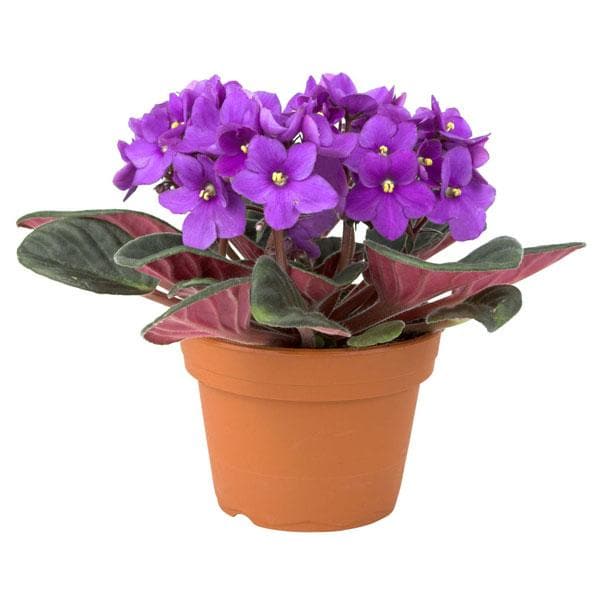Description
| Sr | Item name |
|---|
| 1 | African Violets (Purple) - Plant |
| 2 | 6 inch (15 cm) Grower Round Plastic Pot (Black) |
These East African beauties come in a variety of colou They are compact and neat, making them ideal for a small, crowded desk.
African Violets do well under florescent light, but aren t suitable for offices which don, t switch lights off overnight - they need at least eight hours of darkness a night to produce flowe Water from the bottom up by keeping the pot in a water-filled bowl or tray.African Violets come in several varieties with blooms in many colours, including blue, pink, red, white, purple and multicolour. Some types also have flowers with fringed edges and double petals. These dainty yet hardy flowering plants look great in hanging baskets, in a large planter with a variety of colours or in a single pot.
Plant Specifications
*above specification are indicative only. actual dimensions may vary by +-10%
| Common Name | Baby pink |
| Maximum Reachable Height | 2 to 6 inches |
| Flower Colour | Pink, blue, purple, white or bi-colour will bloom prolifically |
| Bloom Time | Annual |
| Difficulty Level | Easy to moderate. |
Planting and care
Water your indoor African Violets carefully.Feed your African Violets every week.Remove new growth, also called suckers, that grow on the main stem of your African Violets.Keep your African Violets cooler and dryer in the winter.Repot your African Violets as needed.A soil-less mix or 1/3 African violet soil, 1/3 perlite and 1/3 vermiculite in dry climates does very well.African Violets care
African Violets, like other plants, need light for photosynthesis. While photosynthesis is most often associated with a plant s green leaves and stems, its most vital function is to convert carbon, hydrogen and oxygen (in the form of carbon dioxide and water) into usable energy called plant carbohydrates.
Even when all the essential nutrients are available to the plant, a complete absence of sunlight will literally result in starvation.
| Sunlight | Bright, indirect or filtered sunlight, for at least 6 hours per day, will keep an African violet full of blossoms. If morning and afternoon sunshine can be provided (protect from noon sun). |
| Watering | Never allow African Violet soil to dry completely. The use of the water wicks (available at most florists and garden centres) can help you accomplish the constant watering. Placing plants on humidity trays (shallow baking pans with gravel and water) allows development of large leaves because it provides added humidity. |
| Soil | Prepared potting mixes for African Violet are a good investment if you are planning to start and grow your own plants. Such prepared mixes have been pH balanced and have been amended with calcium. |
| Temperature | Home temperature environment of 65 to 70F at night and 75F or higher for days. Quick changes in temperature must be avoided, as well as chilly nights. |
| Fertilizer | Select a high phosphorus fertilizer, such as 12-36-14, to promote bloom. Bone meal, blended with the soil mix at potting time, is also an excellent slow-release source of phosphorus. |
African Violets uses



Comment